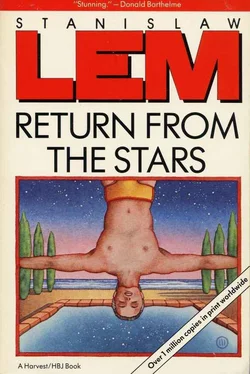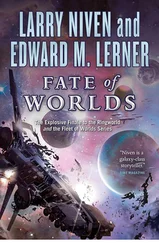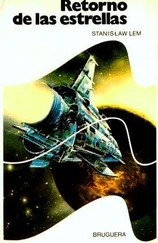Roemer had been right. The essence of the discovery could be expressed only through mathematics — and, I must add, an infernal mathematics. The general solution, holding “for all possible universes,” was given by Emil Mitke, the son of a post-office clerk, a crippled genius who did with the theory of relativity what Einstein had done with Newton. It was a long, unusual story and, like all true stories, improbable, a mixture of matters trivial and momentous, of the ridiculous and the colossal in man, and it culminated at last, after forty years, in the “little black boxes.”
Every vehicle, every craft on water or in the air, had to have its little black box; it was a guarantee of “salvation now,” as Mitke jokingly put it toward the end of his life; at the moment of danger — a plane crash, a collision of cars or trains — the little black box released a “gravitational antifield” charge that combined with the inertia produced by the impact (more generally, by the sudden braking, the loss of speed) and gave a resultant of zero. This mathematical zero was a concrete reality; it absorbed all the shock and all of the energy of the accident, and in this way saved not only the passengers of the vehicle but also those whom the mass of the vehicle would otherwise have crushed.
The black boxes were to be found everywhere: in elevators, in hoists, in the belts of parachutists, in ocean-going vessels and motorcycles. The simplicity of their construction was as astounding as the complexity of the theory that produced them.
Daybreak was reddening the walls of my room when I fell exhausted on my bed.
I was awakened by a robot entering the room with breakfast. It was almost one o’clock. Sitting up in bed, I made sure that nearby was the book I had put aside the previous night — On Interstellar Flight by Starck.
“You have to eat, Mr. Bregg,” the robot said reprovingly. “Otherwise, you will become weak. Also, reading until dawn is inadvisable. Doctors are very much against it.”
“I am sure they are, but how do you know this?” I asked.
“It is my duty, Mr. Bregg.”
It handed me a tray.
“I will try to mend my ways,” I said.
“I hope that you do not misinterpret my good will and think me importunate,” it replied.
“Ah, not at all,” I said. Stirring the coffee and feeling the lumps of sugar crumble beneath the spoon, I was amazed, in a way both serene and profound, not only by the fact that I was actually on Earth, that I had returned, not only by the reading I had done all night, which still agitated me and fermented in my head, but also simply because I was sitting on a bed, my heart was beating — I was alive. I wanted to do something in honor of this discovery, but, as usual, nothing particularly sensible came to mind.
“Listen,” I addressed the robot, “I have a favor to ask you.”
“I am at your command.”
“Do you have a moment? Then play me that tune, the one from yesterday, all right?”
“With pleasure,” it answered. To the merry sound of the music box I drank my coffee in three gulps; as soon as the robot left the room, I changed and ran to the pool. I cannot say why I was in such a constant hurry. Something drove me, as if I sensed that at any moment this peace would come to an end, undeserved as it was and unbelievable. In any case, my endless urgency made me cut across the garden at a run, without looking around me, and in a few bounds I was at the top of the diving-board tower; I had already kicked off when I noticed two people coming out from behind the house. For obvious reasons I could not study them closely. I did a somersault, not the best, and dove to the bottom. I opened my eyes. The water was like shimmering crystal, green, with the shadows of waves dancing on the sunlit bottom. I swam low above it, in the direction of the steps, and when I surfaced there was no one in the garden. But my skilled eyes had fixed a picture in my mind, perceived upside down and in a fraction of a second — of a man and a woman. Apparently I had neighbors now. I debated whether to swim one more length, but Starck won out. The introduction to the book — where he spoke of flights to the stars as a mistake of the early days of astronautics — had so angered me that I was ready to close it and not return to it. But I forced myself. I went upstairs, changed; coming down, I saw on the hall table a bowl full of pale pink fruit somewhat similar to pears; I stuffed the pockets of my gardening overalls with them, then found a secluded spot surrounded on three sides by hedges, climbed an old apple tree, selected a fork in the branches that could take my weight, and there set about studying this obituary on my life’s work.
After an hour, I was not so sure of myself. Starck employed arguments difficult to refute. He based them on the meager data brought back by the two expeditions that had preceded ours; we had called them the “pinpricks,” for they were probes over a distance of only several light years. Starck drew up statistical tables of the probability distribution or “habitation density” of the entire galaxy. The probability of encountering intelligent beings, he concluded, was one in twenty. In other words, for every twenty expeditions — within a radius of a thousand light years — one expedition had a chance of discovering an inhabited planet. This conclusion, however, odd as it may sound, was considered by Starck to be quite encouraging; he demolished the idea of establishing cosmic contacts in a later part of his exposition.
I bridled, reading what an author, unknown to me, had written about expeditions like ours — that is, initiated before the discovery of the Mitke effect and the phenomenon of parastatics — because he regarded them as absurd. But I learned from him, in black and white, that, in principle at least, it was possible to construct a ship that could reach an acceleration on the order of 1,000, perhaps even 2,000 g’s. The crew of such a craft would feel no acceleration or braking; on board, the gravitation would be constant, equal to a fraction of Earth’s. Thus, Starck admitted that flights to the ends of the galaxy, and even to other galaxies — the transgalactodromia of which Olaf had dreamed — were possible, and possible in the span of a single lifetime. At a speed a tiny fraction of a percent less than the speed of light, a crew would age by several or a couple of dozen months in the time it took to reach the depths of the metagalaxy and return to Earth. But in that time not hundreds but millions of years would have elapsed on Earth. The civilization found by those who returned would not be able to assimilate them. It would be easier for a Neanderthal to adapt to life in our time. That was not all. The fate of a group of people was not the issue here. They were the envoys of humanity. Humanity posed — through them — a question, to which they were to bring back an answer. If the answer concerned problems connected with the level of development of the civilization, then humanity would surely obtain it before their return. Because from the posing of the question to the arrival of the answer, millions of years would have passed. The answer, moreover, would be out of date, defunct, for they would be bringing news of the state of the other civilization at the time when they had reached that far shore of the stellar sea. During their journey back, however, that other world would not be standing still, it would move forward a million, two million, three million years. The questions and answers, then, would miss one another, would suffer hundred-century delays, which would nullify them and make any exchange of experiences, values, and ideas impossible. Futile. The astronauts were thus purveyors of dead information, and their work an act of utter and irreversible separation from human history; space expeditions were an unprecedented and expensive — the most expensive possible — desertion of the realm of historical change. And for such a fantasy, a never profitable, always futile madness, Earth was to labor with the utmost effort and give up her best people?
Читать дальше











